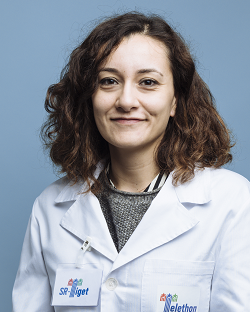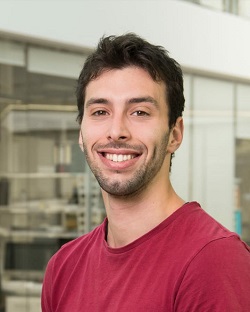
San Raffaele Telethon Institute for Gene Therapy
Senescence in stem cell aging, differentiation and cancer


The group research activity is focused on dissecting the mechanisms that regulate cellular senescence during aging, differentiation and cancer. By combining cell and molecular biology approaches, together with quantitative imaging and next generation sequencing and clinically relevant human samples, the group is elucidating the functional role of senescence-associated pathways and regulators in the human hematopoietic stem cell compartment.
Research activity
The research of our group revolves around three main areas:
- Identification and targeting of senescence programs in hematopoietic stem and progenitor cell (HSPC)-based gene and cell therapies. HSPC exposure to currently available gene engineering approaches may inadvertently trigger the activation of a cellular senescence program, which may hamper the proliferation of gene-modified cells, affect their clonal composition and the dynamics of hematopoietic reconstitution upon transplantation. Our objectives are i) to elucidate the molecular determinants promoting senescence in HSPCs during ex-vivo manipulation and ii) to mitigate senescence barriers and to design innovative strategies for more effective, broader and safer gene therapy approaches.
- Deciphering molecular mechanisms of HSPC aging. The molecular mechanisms that regulate HSPC aging are thought to be cell-intrinsic, however, recent insights support the role for extrinsic factors produced locally by the niche in driving the aged phenotype. We aim to dissect the molecular factors contributing to the aged human hematopoietic compartment and to intervene to ameliorate age-associated HSPC dysfunctions.
- Senescence and epigenetic rewiring in leukemia response to therapy. Emerging evidence indicates that in response to a variety of anti-cancer treatments tumors engage cellular programs (e.g. senescence) that suppress neoplastic cells proliferation and promote many hallmarks of cancer. Our aim is to study how genetic alterations i) impact on hematological neoplasms, ii) alter treatment response, iii) contribute to tumor relapse and iv) create molecular vulnerabilities that may be targeted therapeutically.
Gambacorta V., Beretta S., Ciccimarra M., Zito L., Giannetti K., Andrisani A., Gnani D., Zanotti L., Oliveira G., Carrabba M., Cittaro D., Merelli I., Ciceri F., Di Micco R. *, Vago L*. Integrated Multiomic Profiling Identifies the Epigenetic Regulator PRC2 as a Therapeutic Target to Counteract Leukemia Immune Escape and Relapse. Cancer Discovery 2022.
Di Micco, R.*, Krizhanovsky, V., Baker, D., d’Adda di Fagagna, F*. Cellular senescence in ageing: from mechanisms to therapeutic opportunities. Nature Reviews Molecular Cellular Biology 2021. ( *corresponding authors)
Biavasco R , Lettera E, Giannetti K, Gilioli D, Beretta S, Conti A, Scala S, Cesana D, Gallina P, Norelli M, Basso-Ricci L, Bondanza A, Cavalli G, Ponzoni M, Dagna L, Doglioni D, Aiuti A, Merelli I, Di Micco R, Montini E Oncogene-induced senescence in hematopoietic progenitors features myeloid restricted hematopoiesis, chronic inflammation and histiocytosis. Nat Comm. 2021 Jul 27;12(1):4559.
Gambacorta V, Gnani D, Vago L, Di Micco R. Epigenetic Therapies for Acute Myeloid Leukemia and Their Immune-Related Effects Front Cell Dev Biol. 2019 Oct 11;7:207. eCollection 2019. Review.
Schiroli G, Conti A, Ferrari S, Della Volpe L, Jacob A, Albano L, Beretta S, Calabria A, Vavassori V, Gasparini P, Salataj E, Ndiaye-Lobry D, Brombin C, Chaumeil J, Montini E, Merelli I, Genovese P, Naldini L, Di Micco R. Precise Gene Editing Preserves Hematopoietic Stem Cell Function following Transient p53-Mediated DNA Damage Response. Cell Stem Cell. 2019 Apr 4;24(4):551-565.e8.
Gnani D, Crippa S, Della Volpe L, Rossella V, Conti A, Lettera E, Rivis S, Ometti M, Fraschini G, Bernardo ME, Di Micco R. An early-senescence state in aged mesenchymal stromal cells contributes to hematopoietic stem and progenitor cell clonogenic impairment through the activation of a pro-inflammatory program, Aging Cell. 2019 Jun;18(3):e12933.
Fontanals-Cirera B, Hasson D, Vardabasso C, Di Micco R, Agrawal P, Chowdhury A, Gantz M, de Pablos-Aragoneses A, Morgenstern A, Wu P, Filipescu D, Valle-Garcia D, Darvishian F, Roe JS, Davies MA, Vakoc CR, Hernando E, Bernstein E. Harnessing BET Inhibitor Sensitivity Reveals AMIGO2 as a Melanoma Survival Gene, Molecular Cell 2017, Nov 16;68(4):731-744.e9
Di Micco R*, Fontanals-Cirera B, Low V, Ntziachristos P, Yuen S, Lovell C, Dolgalev I, Yonekubo Y, Zhang G, Rusinova E, Gerona-Navarro G, Canamero M, Ohlmeyer M, Aifantis I, Zhou MM, Tsirigos A*, Hernando E*. Control of embryonic stem cell identity by BRD4-dependent transcriptional elongation of super-enhancer-associated pluripotency genes. Cell Reports 2014 Oct 9;9(1):234-47. (*corresponding author)
Ogrunc M, Di Micco R, Liontos M, Bombardelli L, Mione M, Fumagalli M, Gorgoulis VG, d’Adda di Fagagna F. Oncogene-induced reactive oxygen species fuel hyper-proliferation and DNA damage response activation. Cell Death and Differentiation 2014 Jun; 21(6): 998–1012.
Sulli G, Di Micco R, d’Adda di Fagagna F. Crasstalk between chromatin state and DNA damage response in senescence and cancer. Nat Rev Cancer. 2012 Oct;12(10):709-20.
Suram A, Kaplunov J, Patel PL, Ruan H, Cerutti A, Boccardi V, Fumagalli M, Di Micco R, Mirani N, Gurung RL, Hande MP, d'Adda di Fagagna F, Herbig U. Oncogene-induced telomere dysfunction enforces cellular senescence in human cancer precursor lesions. EMBO J. 2012 Jun 29;31(13):2839-51.
Gaziel-Sovran A, Segura MF, Di Micco R, Collins MK, Hanniford D, Vega-Saenz de Miera E,Rakus JF, Dankert JF, Shang S, Kerbel RS, Bhardwaj N, Shao Y, Darvishian F, Zavadil J, Erlebacher A, Mahal LK, Osman I, Hernando E. miR- 30b/30d regulation of GalNAc transferases enhances invasion and immunosuppression during metastasis. Cancer Cell 2011 Jul 12;20(1):104-18.
Di Micco R, Sulli G, Dobreva M, Liontos M, Botrugno OA, Gargiulo G, dal Zuffo R, Matti V, d’Ario G, Montani E, Mercurio C, Hahn WC, Gorgoulis VG, Minucci S, d'Adda di Fagagna F. Interplay between oncogene-induced DNA damage response and heterochromatin in senescence and cancer. Nature Cell Biology 2011 Mar;13(3):292-302.
Di Micco R, Cicalese A, Fumagalli M, Dobreva M, Verrecchia A, Pelicci PG, d'Adda di Fagagna F. DNA damage response activation in mouse embryonic fibroblasts undergoing replicative senescence and following spontaneous immortalization. Cell Cycle 2008 Nov 15;7(22):3601-6.
Di Micco R, Fumagalli M, Cicalese A, Piccinin S, Gasparini P, Luise C, Schurra C, Garrè M, Nuciforo P, Bensimon A, Maestro R, Pelicci PG, d'Adda di Fagagna F. Oncogene-induced senescence is a DNA-damage checkpoint response triggered by DNA hyper-replication. Nature 2006 Nov 30;444(7119):638-42.










